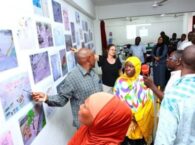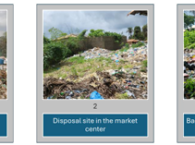Strengthening Youth-Led Community-Supported Agriculture for a Sustainable Food System in Bandung, Indonesia
Metrics
Community
Bandung, West Java, IndonesiaUniversity
Universitas IndonesiaYears
2023-Status
ActiveCase Type
Partnership StoriesFocus Areas
Food Security, Food Sovereignty, Sustainable AgricultureDiscipline
SociologyRegion
Asia, Global, IndonesiaSustainable Development Goals
2 Zero HungerThe shifting dynamics of the food system in Bandung, Indonesia, present formidable challenges to its people and their traditions. Once renowned for agricultural abundance and traditional cuisine, the region faces growing concerns over food security, cultural heritage, and environmental sustainability. As urbanization gains momentum, many fear that traditional food knowledge may be lost to the next generation, eroding cultural identity. Additionally, Bandung’s increasing reliance on imported commodities such as wheat and the expansion of palm oil cultivation—often associated with large-scale deforestation, biodiversity loss, peatland degradation, and land conflicts—raises concerns about sustainability and self-sufficiency. The environmental and social consequences of palm oil production, including greenhouse gas emissions, water pollution, and human rights issues, further highlight the complexity of Bandung’s evolving food landscape.
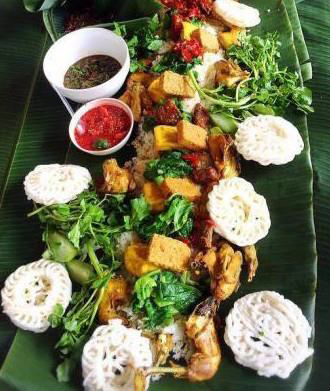
Despite Bandung City’s rich soil and the fact that 97% of its food supply has traditionally come from surrounding peri-urban areas, this balance is shifting. Land conversion for urban expansion and commercial agriculture, particularly palm oil, has begun to reduce the land available for diverse local food production. Climate variability, including shifting rainfall patterns and seasonal flooding, is disrupting agricultural cycles, making food availability and access more precarious. At the same time, consumer preferences are increasingly turning toward non-local and processed foods, driven by globalization, changing diets, and the convenience of imported staples. This trend, coupled with market pressures, has led to a rising dependence on food imports, weakening Bandung’s long-term food sovereignty. While the localized food system has persisted, signs of strain are evident as unsustainable farming practices, economic incentives favoring cash crops, and limited policy interventions weaken its resilience. These challenges place the region’s agricultural heritage at risk and raise concerns about food security in the face of external economic and environmental pressures.
n response, a youth-led initiative is working to strengthen local food production through community-supported agriculture (CSA). Preliminary findings from this initiative highlight a unique opportunity to empower youth and promote sustainable agricultural practices. While local food production remains significant, land conversion, economic shifts, and changing consumer habits are increasing the likelihood of food shortages in the future. By engaging young people in farming, the project maintains the availability of fresh local produce and mitigates environmental degradation caused by unsustainable farming. The initiative promotes agroecological methods that enhance soil fertility, reduce dependence on synthetic inputs, and encourage responsible land management, helping to counteract soil depletion and pollution from chemical fertilizers. Through this approach, young farmers gain leadership skills and contribute to a more resilient and sustainable food system for Bandung.
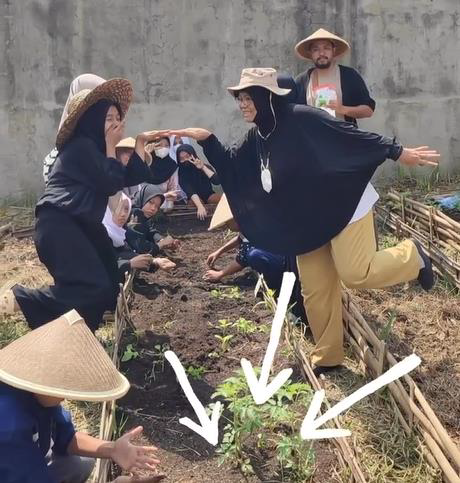
This initiative is a collaborative effort that brings together EPIC members, including Universitas Indonesia through its collaboration with KAIL (Perkumpulan Kuncup Padang Ilalang), a non-profit organization based in Bandung dedicated to enhancing the capacities of individuals and organizations to drive social transformation, along with Seni Tani, a youth-led Community Supported Agriculture (CSA), and other community organizations and government entities. The project was initially led by a Universitas Indonesia PhD student, who played a key role in integrating it into the EPIC-N network and embedding it within university coursework. After graduating, she transitioned to KAIL but remains actively involved, ensuring continued academic engagement. Universitas Indonesia continues to provide research capacity and integrate the project into relevant classes, allowing students to apply what they have learned in sustainable agriculture. Community organizations facilitate outreach and training, while local leaders organize workshops on organic farming, permaculture, and sustainable business practices. These efforts ensure that Bandung’s youth take an active role in preserving agricultural traditions while addressing modern food security and environmental challenges.
Further strengthening the university’s involvement, Mia Siscawati from the Research Cluster on Women, Youth, Gender, Disability, and Social Inclusion at the School of Strategic and Global Studies at Universitas Indonesia is mandated to build capacity for Seni Tani, particularly in gender and inclusiveness. Meanwhile, Suraya Afiff from the Research Cluster on Environment and Social Transformation at the Anthropology Department of Universitas Indonesia is tasked with furnishing Seni Tani with capacity building in organizational development and formulating social movements.
Achievements and Capacity Building
The collaboration yielded several tangible results. One key output was the development of an information kit for CSA Tani Sauyunan members at Seni Tani, a youth-led community-supported agriculture (CSA) initiative in Bandung. The kit included details on membership, available packages, and harvest date schedules. WhatsApp proved instrumental as a channel for maintaining engagement with members, providing updates, and encouraging new sign-ups via positive word-of-mouth. To strengthen community involvement, Seni Tani amplified its social media presence by introducing Stories from the Field, a monthly series of updates that garnered increased attention and participation.
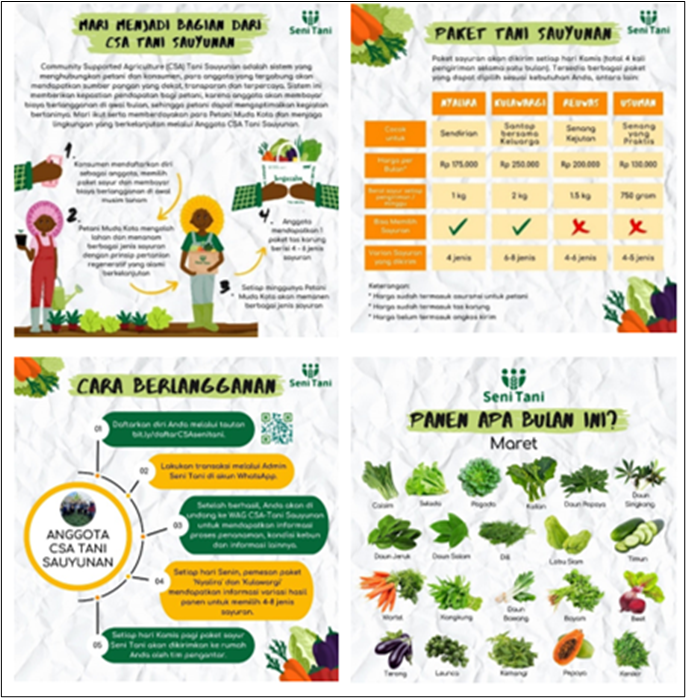
Workshops on capacity building were another cornerstone of the initiative. Facilitated by Universitas Indonesia through KAIL, these workshops focused on gender equality, social inclusion, and organizational development. Seni Tani benefited from these interventions by refining its strategies for inclusiveness, enabling the design of programs tailored to vulnerable groups in Bandung. The capacity-building sessions were enhanced by integrating feedback loops to adapt content dynamically, ensuring relevance to the community’s evolving needs.
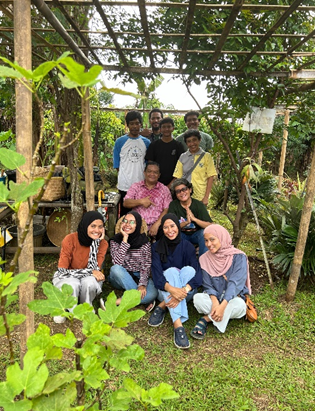
Integration into Academia through the EPIC Model
A defining feature of this initiative was its integration into teaching through the EPIC Model. The collaboration emerged as a response to the needs and aspirations of the local community in Bandung, particularly the youth involved in Seni Tani, a community-supported agriculture (CSA) initiative. Recognizing the challenges of food security, land access, and shifting consumer preferences, Seni Tani engaged with Universitas Indonesia and NGOs to develop sustainable agriculture and social inclusion solutions.
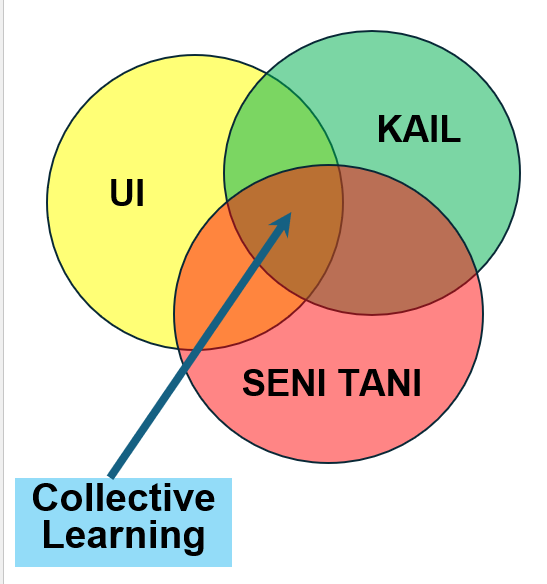
The initiative was incorporated into Universitas Indonesia’s curriculum, serving as a case study in undergraduate courses such as Economic Anthropology and Activism and Social Movement. These courses, led by Suraya Afiff, provided students with valuable insights into the practical applications of their studies, offering a platform to connect theoretical knowledge with real-world challenges. Rather than being a one-way transfer of knowledge from the university to the community, the collaboration was dynamic—the experiences and challenges of the youth-led urban farming initiative informed university students and faculty, while academic research and coursework contributed to strengthening its strategies and organizational development.
By engaging directly with the initiative, students were able to observe and participate in addressing food security and sustainability issues within local communities. The EPIC Model facilitated an interdisciplinary approach, allowing students to apply skills from diverse fields such as economics, sociology, and environmental science. While Universitas Indonesia does not have an agricultural department directly involved in the project, expertise in sustainable agriculture was incorporated through workshops and collaborations with local organizations. Workshops focused on organic farming techniques, permaculture, and agroecology, helping to improve soil health, reduce reliance on chemical inputs, and enhance crop diversity.
These improved agricultural practices, alongside the strengthening of local food networks, contributed to greater community resilience. Through capacity-building efforts, Seni Tani members gained skills in cooperative management, financial sustainability, and social movement strategies, enabling them to scale their impact. The initiative also helped expand urban gardening efforts, integrate zero-waste principles, and build stronger connections between farmers and consumers. As a result, Bandung’s youth became more actively engaged in shaping a sustainable local food system, reinforcing both environmental sustainability and social inclusion.
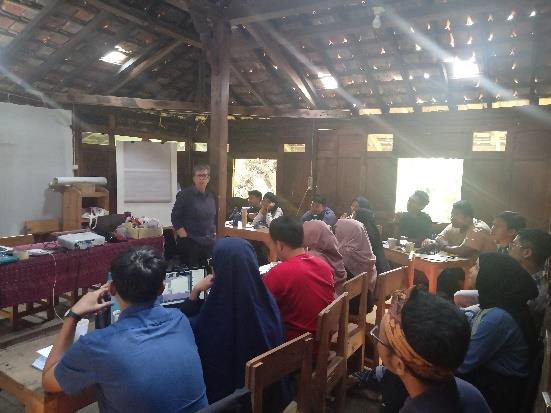
Notably, PhD student Catherine Any Sulistyowati was pivotal in bridging academic research with community impact, demonstrating how theory and practice can intersect to drive sustainable development. Faculty members such as Mia Siscawati, from the Research Cluster on Women, Youth, Gender, Disability, and Social Inclusion, and Suraya Afiff, from the Research Cluster on Environment and Social Transformation, provided essential academic support to ensure that the initiative addressed both social and environmental dimensions. This collaborative approach strengthened the relationship between academia and the community, creating long-term pathways for knowledge exchange and sustainable impact.
Future Directions
The collaboration between Universitas Indonesia, KAIL, and local stakeholders aims to expand the community-supported agriculture (CSA) initiative while strengthening its long-term impacts in Bandung. Plans include fostering deeper connections with local networks to secure access to land and resources essential for sustaining the program. Capacity-building efforts will continue to support local youth-led initiatives, equipping them with the skills and strategies necessary for long-term sustainability. Additionally, the partnership seeks to enhance community involvement through education and outreach, addressing critical areas such as food security, environmental stewardship, and regional resilience.
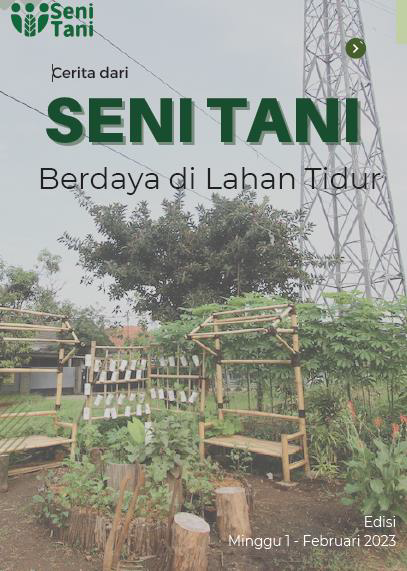
Seni Tani continues its work on community-supported agriculture in Bandung. Starting in October 2024, they secured a $100,000 grant to further strengthen the role of youth in Bandung’s local food system. This initiative is in collaboration with AKATIGA, an established NGO in Bandung City, with financial support from Yayasan Humanis dan Inovasi Sosial (Humanis Foundation), an intermediary organization that supports local initiatives in Indonesia. AKATIGA provides free space for meetings in the Bandung city center, creating a youth engagement and collaborative learning hub. Recognizing that many young people engaged in this initiative are also university students eager to make an impact, the project actively integrates academic participation. By expanding collaborations with various organizations, the initiative seeks to deepen student involvement in shaping Bandung’s sustainable food system, providing them with hands-on opportunities to apply their academic knowledge to real-world challenges while fostering leadership, innovation, and long-term community resilience.
By empowering youth and fostering collaborative efforts among diverse stakeholders, this initiative not only addresses immediate challenges but also exemplifies how the EPIC Model can transform education into a tool for social impact, laying the groundwork for a sustainable and inclusive food system in Bandung, Indonesia.
Partnership Contact Information
KAIL (Perkumpulan Kuncup Padang Ilalang)
Dr Catherine Any Sulistyowati
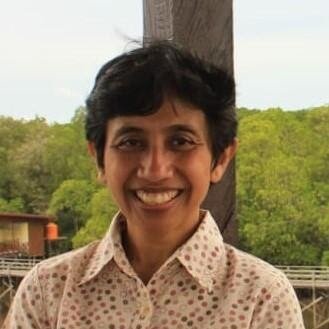
Coordinator for Youth Program and Sustainable Community Initiative
anyapd@gmail.com
Written by: Jonathan Kroeze
Edited by: Kay Phanthuwongpakdee

